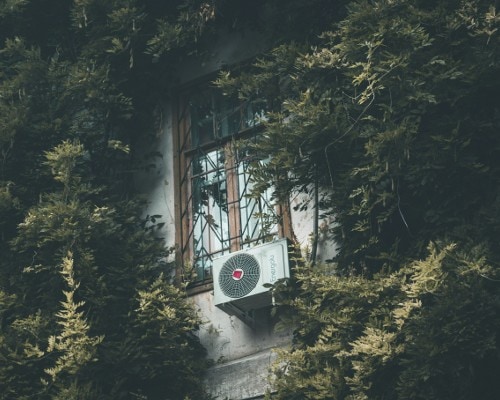At River Valley Air Conditioning, we understand the importance of helping you better comprehend your HVAC system.
One component that stands out is the furnace filter. DIY home care guides often include tips like replacing your filter, but what exactly is it? A furnace filter protects indoor air quality by trapping pollen, dust, and other airborne particles that would otherwise compromise HVAC performance.
So, let’s explore the various furnace filters so you can decide which will best serve your home environment.
Common types of furnace filters
Let’s start with the most popular types of furnace filters.
Note: When discussing filters, it’s good to know the MERV (minimum efficiency reporting value) rating. This rating, ranging from 1 to 20, indicates a filter’s effectiveness in trapping airborne particles. The higher the MERV rating, the better the filter is at capturing smaller particles — contributing to improved air quality in your house.
Fiberglass filters
As the most affordable option — fiberglass filters consist of layers of fiberglass fibers and are designed to trap large dust and lint particles to protect your HVAC equipment. However, they are not the best at improving indoor air quality, as their MERV rating is usually between 1 and 4.
Pleated filters
These are slightly better than fiberglass. They are made from polyester or cotton folds, increasing their surface area, and can catch smaller particles like mites and spores. Pleated filters typically have MERV ratings between 5 and 8, making them a good balance between price and performance.
Electrostatic filters
Electrostatic filters use self-charging cotton or paper fibers to attract and hold particles. They can be especially effective against smoke, pet dander, and other tiny contaminants, with a MERV rating that can reach up to 10.
HEPA filters
HEPA (high-efficiency particulate air) filters are the gold standard in air filtration. They can trap 99.97% of particles, including viruses and bacteria, thus improving indoor air quality significantly. HEPA filters typically have high MERV ratings of 17 to 20.
Activated carbon filters
Activated carbon filters are unique in their ability to filter volatile organic compounds (VOCs) and odors. On top of particle filtration — they also absorb gasses that regular filters can’t catch. Their MERV ratings vary widely depending on the specific design and particle filtration efficiency.
Reusable filters
Reusable filters — washable or permanent — can be cleaned and reused. These are eco-friendly options that vary in effectiveness. MERV ratings typically range between 1 and 4. Reusable filters are more cost-effective, but they require regular cleaning.
Remember — while higher MERV ratings translate to better filtration, they also require more energy to move air through. So with a better filter, you may end up paying a bit more on your bill.
Things to consider when buying a filter
When searching for a filter, look for one that fits you best. Consider its lifespan, cost, compatibility with your existing system and maintenance needs. Here’s a quick comparison of the filters we mentioned above.
Cost
Fiberglass filters tend to be the least costly option, though regular replacements can add up. Pleated filters tend to cost slightly more but last longer. Electrostatic and HEPA filters often cost more due to their superior filtration efficiency.
Activated carbon filters can be costly, especially for those with high MERV ratings. Reusable filters have a higher upfront cost, but their reusability can make them more cost-effective over time.
Lifespan
The lifespan and frequency of filter changes depend on the type of filter in use. Change your fiberglass filters every month; pleated filters may last 60-90 days, while electrostatic ones could last six months or more — depending on usage and air quality conditions.
HEPA filters have the potential to last up to one year, depending on usage and air quality conditions; reusable ones typically last between two to five years.
Maintenance
Disposable filters need to be replaced regularly (frequency can change). Reusable filters require regular cleaning, which can sometimes be labor-intensive. To clean your filter, follow the manufacturer’s instructions to avoid damaging it.
Compatibility
Not all filters will be compatible with your exact unit. Higher MERV filters like HEPA may require a compatible HVAC system due to the increased air resistance.
Always consult with an HVAC professional before changing to a high-efficiency filter.
Health benefits of using effective furnace filters
Effective furnace filters play a significant role in safeguarding our health by maintaining optimal indoor air quality. Here are some key health benefits:
- Improved air quality: High MERV-rated filters, particularly HEPA and activated carbon filters, can eliminate microscopic pollutants, including dust, pollen, smoke, pet dander and even bacteria or viruses. Better air quality means fewer respiratory issues like asthma and allergies.
- Prevention of mold growth: Furnace filters also help prevent mold growth by trapping spores and preventing them from spreading. Mold exposure can lead to health problems and exacerbate allergies.
- Reducing odors and VOCs: Activated carbon filters are able to absorb volatile organic compounds (VOCs) and odor-causing bacteria, providing a healthier and better-smelling indoor environment. VOCs are dangerous; long-term exposure can cause liver, kidney, and central nervous system damage and has been linked to cancer.
- Maintaining heat and airflow: By trapping debris that could block the airflow, furnace filters help maintain the HVAC system’s efficiency. A smoothly running system ensures consistent temperature control, contributing to overall comfort and reducing risks related to extreme temperature fluctuations.
- Reduction in the spread of disease: Especially pertinent in the times of COVID-19, a filter’s ability to trap bacteria and viruses can help prevent illnesses from spreading in your household.
Looking for the perfect furnace filter? Ask the pros!
Choosing the right filter might seem complicated — but don’t fret; we’re here to help! At River Valley Air Conditioning Inc., we’ll assist you in making an informed decision on what filter best suits your needs.
From installation to maintenance and repair — your comfort and health are our top priority!

